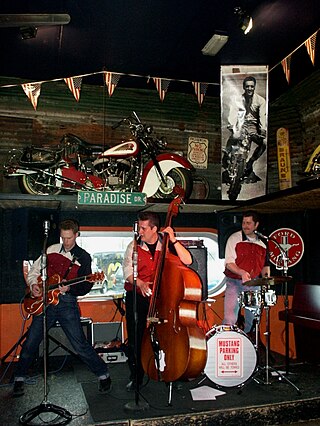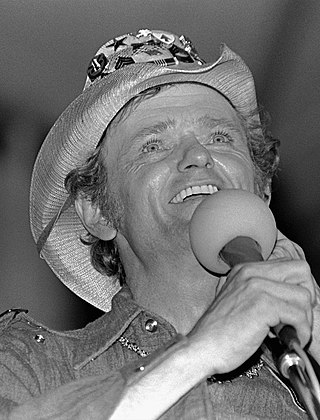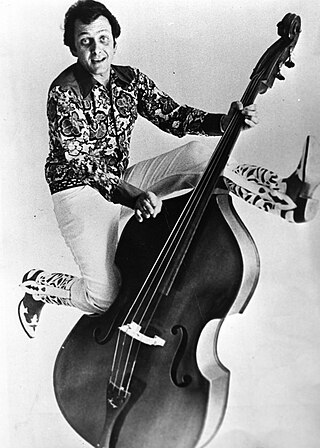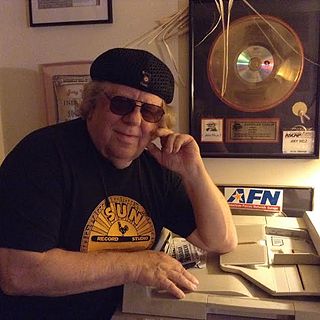
Carl Lee Perkins was an American guitarist, singer and songwriter. A rockabilly great and pioneer of rock and roll, he began his recording career at the Sun Studio, in Memphis, beginning in 1954. Among his best-known songs are "Blue Suede Shoes", "Honey Don't", "Matchbox" and "Everybody's Trying to Be My Baby".

Rockabilly is one of the earliest styles of rock and roll music. It dates back to the early 1950s in the United States, especially the South. As a genre, it blends the sound of Western musical styles such as country with that of rhythm and blues, leading to what is considered "classic" rock and roll. Some have also described it as a blend of bluegrass with rock and roll. The term "rockabilly" itself is a portmanteau of "rock" and "hillbilly", the latter a reference to the country music that contributed strongly to the style. Other important influences on rockabilly include western swing, boogie-woogie, jump blues, and electric blues.

Jerry Reed Hubbard, known professionally as Jerry Reed, was an American country singer, guitarist, composer, songwriter and actor who appeared in more than a dozen films. His signature songs included "Guitar Man", "U.S. Male", "A Thing Called Love", "Alabama Wild Man", "Amos Moses", "When You're Hot, You're Hot", "Ko-Ko Joe", "Lord, Mr. Ford", "East Bound and Down", "The Bird", and "She Got the Goldmine ".
Charles Arthur Feathers was an American musician most associated with the rockabilly scene of the 1950s. Although not initially recognized for his contributions to rockabilly, over time his presence would become greatly elevated and he has been cited as an influence by a number of musicians.
Delmar Allen "Dale" Hawkins was a pioneer American rock singer, songwriter, and rhythm guitarist who was often called the architect of swamp rock boogie.
Luther Monroe Perkins, Jr. was an American country music guitarist and a member of the Tennessee Three, the backup band for singer Johnny Cash. Perkins was an iconic figure in what would become known as rockabilly music. His creatively simple, sparsely embellished, rhythmic use of Fender Esquire, Jazzmaster and Jaguar guitars is credited for creating Cash's signature "boom-chicka-boom" style.

Raymond Charles Campi was an American singer, musician and songwriter, nicknamed "The Rockabilly Rebel". He first recorded in the mid-1950s. Campi's trademark was his white double bass, which he often jumped on top of and "rode" while playing. He was a member of the Rockabilly Hall of Fame.

Warren Smith was an American rockabilly and country music singer and guitarist.
William Owen Bradley was an American musician, bandleader and record producer who, along with Chet Atkins, Bob Ferguson, Bill Porter, and Don Law, was a chief architect of the 1950s and 60s Nashville sound in country music and rockabilly.
Marvin Karlton Rainwater was an American country and rockabilly singer and songwriter who had several hits during the late 1950s, including the self-penned "Gonna Find Me a Bluebird" and "Whole Lotta Woman," which hit #1 on the UK Singles Chart. He was known for wearing Native American fashion-themed outfits on stage and claimed to have quarter-blood Cherokee ancestry.

Billy Wayne "Crash" Craddock is an American country and rockabilly singer. He first gained popularity in Australia in the 1950s with a string of rockabilly hits, including the Australian number one hits "Boom Boom Baby" and "One Last Kiss" in 1960 and 1961 respectively. Switching to country music, he gained popularity in the United States in the 1970s with a string of top ten country hits, several of which were number one hits, including "Rub It In", "Broken Down in Tiny Pieces", and "Ruby Baby". Craddock is known to his fans as "The King Of Country Rock Music" and "Mr. Country Rock" for his uptempo rock-influenced style of country music.
Alvin Wayne Casey was an American guitarist. He was mainly known for his work as a session musician, but also released his own records and scored three Billboard Hot 100 hits in the United States. His contribution to the rockabilly genre has been recognized by the Rockabilly Hall of Fame.
William R. Flagg is an American country and rockabilly singer, who was the first to use the term rockabilly.

Enos William McDonald, better known as Skeets McDonald, was an American country and rockabilly musician popular during the 1950s and 60s. Best known for the Slim Willet-penned song "Don't Let the Stars Get in Your Eyes", McDonald was a devoted honky tonk singer and songwriter whose work helped to bridge the gap between country and rock and roll.

Thomas Paulsley LaBeff, known professionally as Sleepy LaBeef, was an American singer and musician.
Robert Autry Inman was an American country and rockabilly musician.
This article includes an overview of the major events and trends in popular music in the 1950s.
Arnold Joseph Poovey, often credited on record and stage as "Groovey" Joe Poovey, was an American rockabilly and country singer, songwriter, guitarist and radio disc jockey. His best known record was "Ten Long Fingers", recorded in 1958.

Joseph W. Welz is an American musician best known for his tenure as pianist with Bill Haley & His Comets.
Willie Murray Adams was an American rockabilly musician and a member of the Rockabilly Hall of Fame. He recorded the 1950s song "Rock, Pretty Mama", recognized as "a seminal rockabilly classic" by critics. Other songs he recorded in the 1950s include "You Heard Me Knocking", "True Love Will Come Your Way", and "You Gotta Have a Duck Tail". He toured with his family band for decades and, as his rockabilly interest declined, he entered the ministry and wrote Gospel songs. He made a comeback late in his career when a collection of 27 of Adams' songs was released in 2002. Fans re-embraced his rockabilly music 45 years after the original recordings, igniting demand for his appearances at music festivals in U.S. and Britain. Adams died March 30, 2019, at age 79.








